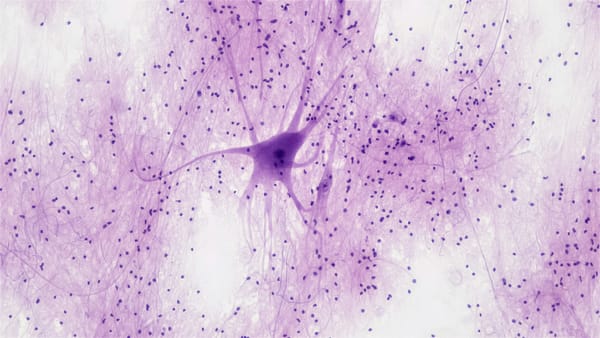
By Pushpa Nair
Targeting necrosis - an uncontrolled form of cell death - could slow ageing and age-related diseases. Here’s what you need to know.
Earlier this year, Bryan Johnson’s documentary, Don’t Die: The Man Who Wants to Live Forever, hit Netflix’s Top 10 - a reminder of society’s growing obsession with youth, longevity and defying death.
But watching Johnson’s gruelling quest for the Holy Grail of anti-ageing - involving 100 pills a day, punishing workouts and relentless self-testing - was a bit like watching a man try to outrun his own shadow. Which raises the question: how much do we really understand about ageing and is there a better way to approach it?
A fascinating review, published in Oncogene by a team of scientists collaborating from LinkGevity (a UK-based biotech company), UCL, Harvard, NASA, and the European Space Agency, suggest a key finding. Necrosis - a chaotic, uncontrolled form of cell death - could lie at the heart of human biological decline. Crucially, there may be ways to stop it.
The researchers suggest that necrosis may be a key driver behind ageing and chronic disease - not just the by-product of illness or injury, as previously believed.
Carina Kern, lead author and CEO of LinkGevity, said: “What the paper shows is really that necrosis is one of these central nodes across multiple different and diverse age-related diseases.”
The concept of necrosis in itself is not new. “The knowledge gap has been finding a way to intervene,” Kern explained: “It's exciting because I think we are very, very close.” Stopping or pausing necrosis could transform medicine, extend healthy lifespans and even enhance the body’s ability to withstand extreme environments such as space.
What is necrosis - and why does it matter?
Our bodies are made up of trillions of cells, which are constantly growing, dividing, and dying. Some forms of cell death - like apoptosis - are planned, tidy and regulated by our DNA, helping to clear away old or damaged cells. But others - like necrosis - are unplanned, chaotic and destructive.
Necrosis, from the Greek nekros (meaning death), happens when a cell is exposed to stress, such as infection or trauma, triggering a deadly influx of calcium - a mineral that normally plays a vital role in cell functioning. The cell swells, its membrane bursts, and its contents spill out, damaging surrounding tissues and causing inflammation.
“Calcium levels are dysregulated and tipped out of place,” Kern explained, initiating a destructive cascade that results in necrosis.
This also sends alert signals - known as DAMPs (damage-associated molecular patterns) - to the immune system, triggering more inflammation and a toxic feedback loop that drives tissue damage and degeneration. Over time, damaged cells lose their ability to ‘bounce’ back, leading to impaired resilience, which is a hallmark of ageing and chronic disease.
Until recently, necrosis was seen as the unavoidable endpoint of injury or infection. But, in a major shift, Kern and her colleagues suggest that it is an active driver of ageing and chronic disease. This presents us with a promising new target for potential drug treatments aimed at halting these conditions, with the advantage of minimal negative side effects.
Kern explains: “A key benefit with necrosis is you are very unlikely to see a trade-off cost because necrosis is purely deleterious from an evolutionary point of view.”
This contrasts with approaches targeting genetically programmed cell death (like apoptosis), which have benefits for the body. Kern stated: “If you switch them off, you may increase the risk of cancer, or you may worsen your ability to heal wounds.”
Stopping necrosis: medicine, longevity and space travel
Blocking necrosis could have potential benefits across multiple conditions, including heart attacks, kidney disease, dementia and cancer, the Oncogene paper states.
A particular focus has been on the kidneys, as they are highly susceptible to necrosis. Kern notes: “Just being able to intervene in kidney disease would be phenomenal, given it’s the 9th leading cause of death globally.”
Necrosis may also explain the accelerated ageing and organ damage astronauts experience in space - a major obstacle for humans ever making it to Mars - due to the effects of microgravity and damage by cosmic radiation.
“One year on the surface of Mars, with current technology and shielding - it’s a bit like being exposed to Hiroshima from about 10 kilometres away,” explained Dr Keith Siew, part of UCL’s Centre for Kidney & Bladder Health and Co-lead of the London Tubular Centre.
Kidneys are especially vulnerable, Siew explains: “So that's why we think inhibiting necrosis could be one way to stem the tide of the kind of damage you're seeing in spaceflight for all organ systems - but the kidneys in particular as a model.”
Protecting kidneys from radiation could also be life-changing for cancer patients undergoing radiotherapy. Siew explained: “Your dose-limiting organ is the kidney. If we can protect the kidney from radiation damage, we now have a better means of treating cancer patients.”
Siew also sees potential for necrosis inhibition to extend cell life outside the body - revolutionising organ preservation for transplants and helping develop less invasive diagnostic tests.
LinkGevity and the quest for an anti-necrotic therapy – how close are we?
Kern is CEO of LinkGevity, a biotech company based at the Babraham Research Campus in Cambridge. It is one of several companies - like Juvenescence, BioAge Labs, and Insilico Medicine - using Artificial Intelligence (AI) to identify drug targets for ageing and age-related disease.
However, LinkGevity’s AI-based Blueprint Theory of Ageing, which maps core ageing mechanisms, was the first to pinpoint necrosis as a potential target. Kern said: “For the first time, it told you how to intervene in necrosis, which was previously unknown.”
LinkGevity is currently developing its Anti-Necrotic™ therapeutic - on track to initiate its Phase 2 Clinical Trials in humans - initially targeting acute kidney injury, where necrosis mechanisms are well-understood.
Results look promising. “From everything that we've seen in the lab, we're getting 90% suppression of necrosis, and this is across tissue types, across stressors,” Kern said.
In a key step forward, the plan for the trial is to also measure markers for kidney ageing. “We're hoping to add exploratory endpoints for ageing and use that as an accelerated ageing model to get it as the first drug approved for ageing,” Kern said.
Impressively, LinkGevity Anti-Necrotic™ therapeutic was listed as one of 12 global innovations in NASA’s space health program - one of only two non-US companies on that list.
What does the future hold?
If LinkGevity is right and we can successfully intervene in necrosis, the implications are ground-breaking - from slowing chronic disease, protecting organs and prolonging healthy lifespans to extending the frontiers of space travel.
“I think we're really at the cusp of a revolution,” says Kern.
However, the field is still young. No drugs capable of blocking necrosis have yet made it to the market, and we are still to see if success in animal studies will translate to humans.
“It'll never be a single-use miracle cure for everything,” Siew says, but it could form part of a wider strategy to combat ageing and age-related diseases. However, the aim is not to chase immortality. “I think the shift towards health span is really what we should be focused on,” Siew emphasised - the years of life lived free from disease and decline.
But as we edge closer to that Holy Grail, we must tread carefully. Ethical frameworks are essential to draw clear boundaries between science and profit and ensure fair access to emerging therapies.
Sources
Kern, C., Bonventre, J.V., Justin, A.W. et al. Necrosis as a fundamental driver of loss of resilience and biological decline: what if we could intervene?. Oncogene 44, 1893–1904 (2025). https://doi.org/10.1038/s41388-025-03431-y
Siew, K., Nestler, K.A., Nelson, C. et al. Cosmic kidney disease: an integrated pan-omic, physiological and morphological study into spaceflight-induced renal dysfunction. Nat Commun 15, 4923 (2024). https://doi.org/10.1038/s41467-024-49212-1
Could ‘pausing’ cell death be the final frontier in medicine on Earth and beyond? [UCL Press Release]: https://www.ucl.ac.uk/news/2025/may/could-pausing-cell-death-be-final-frontier-medicine-earth-and-beyond
LinkGevity: https://www.linkgevity.com/pipeline




